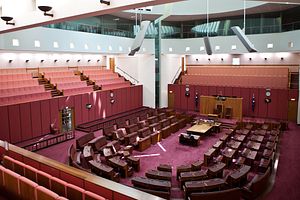In just under a week, Australia’s newly elected Senate has thwarted not one but two of Prime Minister Tony Abbott’s signature policies: repealing the carbon tax and delivering a fiscally austere budget. But obstruction in the upper house has not only been driven by the main opposition party, Labor – a handful of independents and minor parties have also played a role.
The new Senate now includes 18 crossbenchers, elected members who are part of neither the government nor opposition, which is the largest number in Australia’s political history. This new dynamic looks set to alter both the balance and nature of power in the upper house. For the Coalition government, unexpected delays and political compromise could start to threaten what already is a very contentious legislative agenda.
This was clearly the case last week when the government tried to push through legislation to abolish the carbon tax, a pricing scheme introduced by the previous Labor government to reduce greenhouse gas emissions and improve energy efficiency. On Monday, the three senators of Australian businessman Clive Palmer’s Palmer United Party (PUP), independent Nick Xenophon and Ricky Muir joined forces with Labor and the Greens to defeat (36 votes to 32) the Coalition’s efforts to speed up the parliamentary debate. On Thursday, the repeal was defeated when PUP senators unexpectedly voted down the legislation (37 to 35).
Palmer, seemingly at the heart of every political event these days, cited a lack of time for his party to circulate an amendment to ensure all savings businesses receive from the carbon tax repeal are passed on to consumers. Whether a genuine policy disagreement or political theater, the Coalition government has been keen to downplay the repeated setbacks.
The Coalition’s Senate leader Eric Abetz referred to the rejection of the carbon tax repeal as a “technical issue,” vowing to reintroduce the legislation once again on July 14. Abbott was equally confident that he could garner enough support from the crossbenchers for Monday’s vote, suggesting that “Mr. Palmer will change his mind by Monday,” according to The Sydney Morning Herald.
But it wasn’t just the climate tax repeal that took a hit last week. The Coalition budget for 2013-4 is looking less and less likely to deliver its expected savings after a repeal of $1.5 billion in tax cuts was also blocked in the Senate. This time Labor, the Greens, and the Palmer United Party were joined by Liberal Senator David Leyonhjelm to approve the tax cuts, which were originally introduced by the previous government to compensate for an increase in the carbon price – the very price Abbott was unable to repeal.
Taking a step back, however, these developments shouldn’t be too surprising. This year’s record number of crossbenchers is simply part of a much broader trend that has seen votes for the Senate gradually drift away from Labor and Liberal towards independents and minor parties. On the other hand, although historically most Australian governments rarely hold a majority in both houses of Parliament, recent events suggest something more could be at play.
The political significance of the Coalition government’s legislative agenda, the heightened media attention given to the new Senate, and a much more unpredictable balance of power have seemingly set up a perfect storm for a much more contentious upper house. Tony Abbott, for one, will be hoping that isn’t the case as he tries once again to repeal the carbon tax this week. No doubt all eyes will be focused on how things develop this week in Parliament.

































